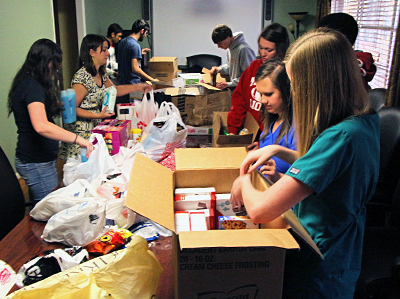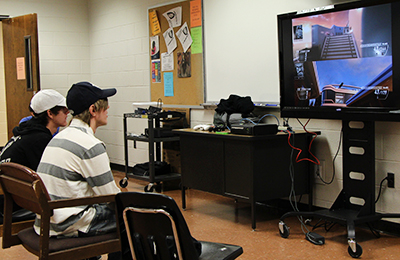Service Learning at JSU Combines Academics, Civic Responsibility
02/05/2014

Recently I had students crowd into my office to tell me that a grammatical mistake would not stand; they would not have it, and it must be changed. These were freshmen in my Fall 2013 Honors Freshman Composition course who had just read the phrase “JSU: Were Your Going” on a flier for a video game tournament the class organized. By the time class actually started and I arrived in the classroom, these students and several others had accosted the young man responsible for the flier and had made him correct the mistakes.
As an English teacher, I dream of that kind of engagement with grammar, and it was brought about by the service-learning component of the class. If you are interested in this level of engagement with the knowledge and skills of your discipline, read on, about what service learning is and how it can benefit your classroom and your students.
Service learning is an instructional method that allows students
• to engage with the community;
• to reflect on their experiences, making connections between those experiences and course materials as well as the academic discipline;
• to enter into public dialogue through writing, research, or other course activity;
• to learn the practical applications of their studies;
• and to become actively contributing citizens and community members through the service they perform.
Service learning differs from traditional service in that service learning combines academics with service; indeed, integrating service opportunities with academics is a key component of service learning. Service learning helps foster civic responsibility in students; enhances academic curriculum; and has positive personal, social, educational, and professional outcomes for students and institutions.
During the fall of 2013, my two sections of Honors Freshman Composition developed service projects in relation to Tim O'Brien's Vietnam War novel, The Things They Carried, in other words, projects having to do with military personnel and/or their families. Groups in each class presented project proposals and each class voted on a project. Then we spent the rest of the semester implementing the project. My 10:00 class chose to hold a Call of Duty: Black Ops tournament to raise money for the Wounded Warrior Project, while my 11:15 solicited donations for care packages to be sent to active-duty military personnel overseas. Both projects were successful, but, perhaps more importantly, the students understood that there is a larger purpose to their classroom education than they might have otherwise. They realized that writing isn't just about getting a grade in a freshman class and then moving on.
Similarly, service learning approaches offer some distinct advantages for Emergency Management degree programs. This program links educational objectives with the world of practice in such a way that the student, the university, and the community all benefit from their experiences. Real world practice settings offer students an opportunity to immediately use and apply their classroom knowledge and skills, and receive valuable feedback through assessment and reflection. Service learning also allows students to experience various emergency management roles and functions, and thus contributes to a successful transition from school to the workplace. Students also report that such practice experience makes them a more attractive candidate when applying for jobs, giving them an edge in the job market.
Indeed, recently Dr. Tanveer Islam, Assistant Professor of Emergency Management, worked with his PhD student, Celeste Richardson, on a very successful service-learning project. Together, and in collaboration with the Etowah County EMA, they developed the “Shelter Etowah” app for Android phones, which provides information to users about 12 community shelters located in Etowah County (with shelter addresses, image of shelters, contact and other information, such as if a shelter allows pets, is handicap accessible, etc.). The users can view the status of the shelters live (i.e. open or closed) on a map through the app so that they can take refuge in an open shelter during a severe weather emergency such as tornado warning. The app also can help users to navigate to a shelter from their current locations using GPS features. If necessary, users can make calls directly to shelters by one touch using the app. This is just the kind of service-learning experience that lets students experience the ins and outs of their professions, while gaining experience, making professional connections, and providing needed service to their communities.
 In the College of Nursing, students participate in the KidCheck program. The KidCheckPlus program in Alabama is a one-of-a-kind initiative that coordinates students from a variety of Colleges of Nursing across the state with school health nurses to provide comprehensive health screenings. In 2011, the program became part of a nonprofit organization known as Sight Savers America. Jacksonville State University’s College of Nursing is an active partner in the program. JSU nursing students have screened 6264 school-aged children in pre K through junior high school in Piedmont City Schools, Pleasant Valley Elementary School, Albertville City Schools, and Attalla City Schools (KidCheckPlus, 2013). This program is a very active student learning opportunity. The nursing students, under faculty supervision, perform hundreds of health screenings in a day to a population of children that may not have routine health care. The nursing students perform assessment skills and see health alterations in an outpatient community setting, building their clinical judgment and teaching them referral and client education skills. At the same time, children are getting problems or potential problems identified for further evaluation.
In the College of Nursing, students participate in the KidCheck program. The KidCheckPlus program in Alabama is a one-of-a-kind initiative that coordinates students from a variety of Colleges of Nursing across the state with school health nurses to provide comprehensive health screenings. In 2011, the program became part of a nonprofit organization known as Sight Savers America. Jacksonville State University’s College of Nursing is an active partner in the program. JSU nursing students have screened 6264 school-aged children in pre K through junior high school in Piedmont City Schools, Pleasant Valley Elementary School, Albertville City Schools, and Attalla City Schools (KidCheckPlus, 2013). This program is a very active student learning opportunity. The nursing students, under faculty supervision, perform hundreds of health screenings in a day to a population of children that may not have routine health care. The nursing students perform assessment skills and see health alterations in an outpatient community setting, building their clinical judgment and teaching them referral and client education skills. At the same time, children are getting problems or potential problems identified for further evaluation.
For several years now the Service Committee, one of the University Strategic Planning Committees, has been working to define service learning and gauge the interest of faculty members in this educational approach while also fostering and learning from the service-learning efforts already underway at JSU.
To further our efforts, the committee will be conducting a survey of faculty about their knowledge of and interest in service learning. We hope that this article has sparked your interest and provided you with some useful information about this instructional method. Please be on the lookout for the survey in the next few weeks, which will be followed by other events highlighting service learning. In the meantime, should you have any questions or like any further information please contact me, Teresa Reed, at treed@jsu.edu.

